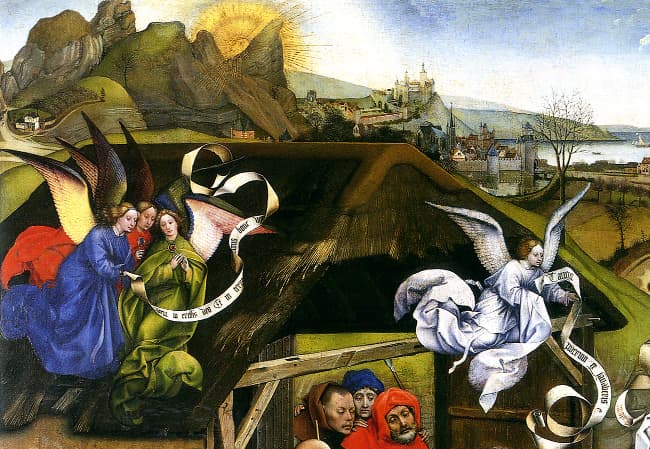Poem of the Day: ‘Nativity’
John Donne’s range is dazzling, even as he returns again and again to the same question: How, given the stark reality of his own fallenness, to approach God’s perfection?

It’s fitting that the poems of John Donne, that metaphysical giant of the 17th century, should appear so regularly as New York Sun Poems of the Day. Donne’s range is dazzling, even as he returns again and again to the same question: How, given the stark reality of his own fallenness, to approach God’s perfection? How to enter that stainless presence? Such “Holy Sonnets” as “I Am a Little World Made Cunningly,” which appeared here in March 2022, strive toward an answer to this seeming impossibility.
In one of the Sun’s 2023 Holy Week poems, “Good Friday, 1613. Riding Westward,” he again sets out the conflict between what a man does and what he knows he ought to do, the poem’s speaker riding away from God even as his soul burns for reconciliation. “Air and Angels,” meanwhile, a Poem of the Day last winter, demonstrates the intellectual and imaginative struggle involved in apprehending the sacramental reality that underwrites human love.
Given the emotional, intellectual, and formal complexity of these other poems, today’s Christmas Poem of the Day, “Nativity,” may strike us as simple. That is, as Donne’s poems go, it looks simple. A Petrarchan sonnet with a rhyme scheme of cddcee in the sestet, “Nativity” considers the paradox of eternity contained in flesh.
Yet — like the mystery of the Incarnation itself — this poem constitutes a single event in a larger, more complicated cycle. It’s one of a “corona” or crown of seven sonnets, meditating by turns on the Annunciation, the finding of the child Jesus in the Temple, the Crucifixion, the Resurrection, and the Ascension into heaven. The closing line of each poem becomes the opening line of the next, linking each mystery it contemplates to a larger narrative arc.
In this sonnet crown, as in the liturgical calendar, “Nativity” grows organically from “Annunciation,” as the “immensity cloister’d in thy dear womb” emerges into the world and begins his earthly journey. “Faith’s eye” apprehends how the author of time and space lies confined in a single place, a single moment. In his pity for his creatures, he has made himself pitiable, a helpless child.
Nativity
by John Donne
Immensity, cloister’d in thy dear womb,
Now leaves His well-beloved imprisonment.
There he hath made himself to his intent
Weak enough, now into our world to come.
But O! for thee, for Him, hath th’ inn no room?
Yet lay Him in this stall, and from th’ orient,
Stars, and wise men will travel to prevent
The effects of Herod’s jealous general doom.
See’st thou, my soul, with thy faith’s eye, how He
Which fills all place, yet none holds Him, doth lie?
Was not His pity towards thee wondrous high,
That would have need to be pitied by thee?
Kiss Him, and with Him into Egypt go,
With His kind mother, who partakes thy woe.
___________________________________________
With “Poem of the Day,” The New York Sun offers a daily portion of verse selected by Joseph Bottum with the help of the North Carolina poet Sally Thomas, the Sun’s associate poetry editor. Tied to the day, or the season, or just individual taste, the poems are drawn from the deep traditions of English verse: the great work of the past and the living poets who keep those traditions alive. The goal is always to show that poetry can still serve as a delight to the ear, an instruction to the mind, and a tonic for the soul.
